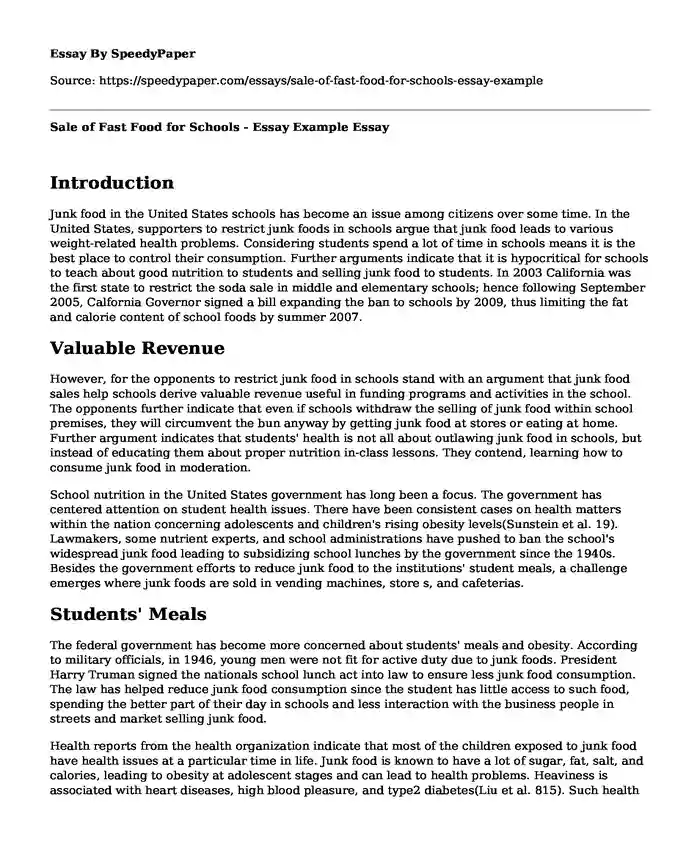Introduction
Junk food in the United States schools has become an issue among citizens over some time. In the United States, supporters to restrict junk foods in schools argue that junk food leads to various weight-related health problems. Considering students spend a lot of time in schools means it is the best place to control their consumption. Further arguments indicate that it is hypocritical for schools to teach about good nutrition to students and selling junk food to students. In 2003 California was the first state to restrict the soda sale in middle and elementary schools; hence following September 2005, Calfornia Governor signed a bill expanding the ban to schools by 2009, thus limiting the fat and calorie content of school foods by summer 2007.
Valuable Revenue
However, for the opponents to restrict junk food in schools stand with an argument that junk food sales help schools derive valuable revenue useful in funding programs and activities in the school. The opponents further indicate that even if schools withdraw the selling of junk food within school premises, they will circumvent the bun anyway by getting junk food at stores or eating at home. Further argument indicates that students' health is not all about outlawing junk food in schools, but instead of educating them about proper nutrition in-class lessons. They contend, learning how to consume junk food in moderation.
School nutrition in the United States government has long been a focus. The government has centered attention on student health issues. There have been consistent cases on health matters within the nation concerning adolescents and children's rising obesity levels(Sunstein et al. 19). Lawmakers, some nutrient experts, and school administrations have pushed to ban the school's widespread junk food leading to subsidizing school lunches by the government since the 1940s. Besides the government efforts to reduce junk food to the institutions' student meals, a challenge emerges where junk foods are sold in vending machines, store s, and cafeterias.
Students' Meals
The federal government has become more concerned about students' meals and obesity. According to military officials, in 1946, young men were not fit for active duty due to junk foods. President Harry Truman signed the nationals school lunch act into law to ensure less junk food consumption. The law has helped reduce junk food consumption since the student has little access to such food, spending the better part of their day in schools and less interaction with the business people in streets and market selling junk food.
Health reports from the health organization indicate that most of the children exposed to junk food have health issues at a particular time in life. Junk food is known to have a lot of sugar, fat, salt, and calories, leading to obesity at adolescent stages and can lead to health problems. Heaviness is associated with heart diseases, high blood pleasure, and type2 diabetes(Liu et al. 815). Such health issues limit the youth from making it to some job opportunities they might have in life.
Conclusion
In conclusion, a student's health should not be an issue of discussion. Having in mind that today's children and youth are tomorrow's government, we should give what it might cost us to ensure good health besides education. Besides, a well-educated professor or doctor, amongst others but with critical health issues is limited to the nation's service. Critical health issues at old age that can be prevented at a younger age in children should be of consideration to all the children to secure a better future at old age with good health and be useful at any given field of service considering education qualification. Thus in consideration of all the above information, we should, by all means, restrict junk food in school.
Works Cited
Liu, Wei, et al. "Space-time analysis of unhealthy food advertising: New Zealand children's exposure and health policy options." Health promotion international 35.4 (2020): 812-820.
https://academic.oup.com/heapro/article-abstract/35/4/812/5549239
Sunstein, Cass R., Lucia A. Reisch, and Julius Rauber. "A worldwide consensus on nudging? Not quite, but almost." Regulation & Governance 12.1 (2018): 3-22.
https://onlinelibrary.wiley.com/doi/abs/10.1111/rego.12161.
Cite this page
Sale of Fast Food for Schools - Essay Example. (2024, Jan 01). Retrieved from https://speedypaper.net/essays/sale-of-fast-food-for-schools-essay-example
Request Removal
If you are the original author of this essay and no longer wish to have it published on the SpeedyPaper website, please click below to request its removal:
- Free Essay Example on Quinoa
- Free Essay on the Benefits of Going to College
- Education Essay Sample on Public and Private Universities
- Essay Sample: Tablets versus Textbooks in Schools
- Free Essay with a Proposal about College Issue
- Free Essay. Applied Behavioral Analysis in Public Schools
- Why College Education should be Free - Essay Sample
Popular categories





